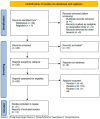Gene Therapy and Diabetes: A Narrative Review of Recent Advances and the Role of Multidisciplinary Healthcare Teams
- PMID: 39858654
- PMCID: PMC11764737
- DOI: 10.3390/genes16010107
Gene Therapy and Diabetes: A Narrative Review of Recent Advances and the Role of Multidisciplinary Healthcare Teams
Abstract
Introduction: Gene therapy has emerged as a promising frontier in the management of diabetes, offering innovative approaches to address both type 1 and type 2 diabetes. This narrative review examines the advancements in gene therapy applications, focusing on both animal and human studies, and includes a total of 11 studies in adherence to PRISMA guidelines. These studies utilize various viral vectors, such as adeno-associated virus (AAV) and lentivirus, to deliver genes that regulate insulin production and enhance angiogenesis. This review aims to synthesize recent advancements in gene therapy for both type 1 and type 2 diabetes and its complications, and to explore the evolving role of pharmacists in this emerging field. Methods: A comprehensive search was conducted to identify relevant studies on gene therapy for diabetes. Databases such as PubMed, the Cochrane Database of Systematic Reviews, the Cochrane Central Register of Controlled Trials, and Google Scholar were queried using keywords such as "Diabetes", "gene therapy", "Type 1 diabetes", and "Type 2 diabetes". Both animal and human studies were included to provide a broad perspective on the advancements in this field. Results: Animal model studies have shown promising results, including sustained insulin production, improved glucose homeostasis, and enhanced wound healing. Human studies, though fewer in number, have reported significant advancements. Patients with diabetic neuropathy treated with plasmid VEGF and recombinant adeno-associated virus (rAAV) showed improvements in neuropathic symptoms and glycemic control. Other studies involving intramuscular injections of VM202 and bicistronic VEGF165/HGF plasmid have reported pain reduction, improved healing of ischemic lesions, and increased angiogenesis. Conclusions: Despite these encouraging results, limitations such as small sample sizes, short follow-up periods, and the necessity for more extensive clinical trials persist. Diabetes is a metabolic syndrome that requires the collaboration of a multidisciplinary team to assist in several aspects of implementing successful gene therapy. Several healthcare providers and policy makers may play a crucial role in patient education, counseling, and the management of gene therapy treatments.
Keywords: HGF (hepatocyte growth factor); VEFG (vascular endothelia growth factor); gene therapy; glycemic control; type 1 diabetes; type 2 diabetes; wound healing.
Conflict of interest statement
The authors declare no conflicts of interest.
Figures
Similar articles
-
Adeno-associated viral vector-mediated human vascular endothelial growth factor gene transfer stimulates angiogenesis and wound healing in the genetically diabetic mouse.Diabetologia. 2003 Apr;46(4):546-55. doi: 10.1007/s00125-003-1064-1. Epub 2003 Apr 2. Diabetologia. 2003. PMID: 12677400
-
The Efficacy of HGF/VEGF Gene Therapy for Limb Ischemia in Mice with Impaired Glucose Tolerance: Shift from Angiogenesis to Axonal Growth and Oxidative Potential in Skeletal Muscle.Cells. 2022 Nov 29;11(23):3824. doi: 10.3390/cells11233824. Cells. 2022. PMID: 36497083 Free PMC article.
-
The future of Cochrane Neonatal.Early Hum Dev. 2020 Nov;150:105191. doi: 10.1016/j.earlhumdev.2020.105191. Epub 2020 Sep 12. Early Hum Dev. 2020. PMID: 33036834
-
The status of gene vectors for the treatment of diabetes.Cell Biochem Biophys. 2007;48(2-3):183-90. doi: 10.1007/s12013-007-0023-8. Cell Biochem Biophys. 2007. PMID: 17709888 Review.
-
Adeno-associated virus (AAV) as a vehicle for therapeutic gene delivery: improvements in vector design and viral production enhance potential to prolong graft survival in pancreatic islet cell transplantation for the reversal of type 1 diabetes.Curr Mol Med. 2001 May;1(2):245-58. doi: 10.2174/1566524013363979. Curr Mol Med. 2001. PMID: 11899074 Review.
Cited by
-
Unraveling the Mystery of Insulin Resistance: From Principle Mechanistic Insights and Consequences to Therapeutic Interventions.Int J Mol Sci. 2025 Mar 19;26(6):2770. doi: 10.3390/ijms26062770. Int J Mol Sci. 2025. PMID: 40141412 Free PMC article. Review.
References
-
- American Diabetes Association . Statistics About Diabetes. American Diabetes Association; Arlington County, VA, USA: 2023.
-
- Blonde L., Umpierrez G.E., Reddy S.S., McGill J.B., Berga S.L., Bush M., Chandrasekaran S., DeFronzo R.A., Einhorn D., Galindo R.J., et al. American Association of Clinical Endocrinology Clinical Practice Guideline: Developing a Diabetes Mellitus Comprehensive Care Plan-2022 Update. Endocr. Pract. 2022;28:923–1049. doi: 10.1016/j.eprac.2022.08.002. Erratum in Endocr. Pract. 2023, 29, 80–81. - DOI - PMC - PubMed
-
- Rotenstein L.S., Kozak B.M., Shivers J.P., Yarchoan M., Close J., Close K.L. The Ideal Diabetes Therapy: What Will It Look Like? How Close Are We? Clin. Diabetes. 2012;30:44–53. doi: 10.2337/diaclin.30.2.44. - DOI
-
- What Is Gene Therapy? [(accessed on 1 December 2024)]; Available online: https://www.fda.gov/vaccines-blood-biologics/cellular-gene-therapy-produ....
Publication types
MeSH terms
LinkOut - more resources
Full Text Sources
Medical



